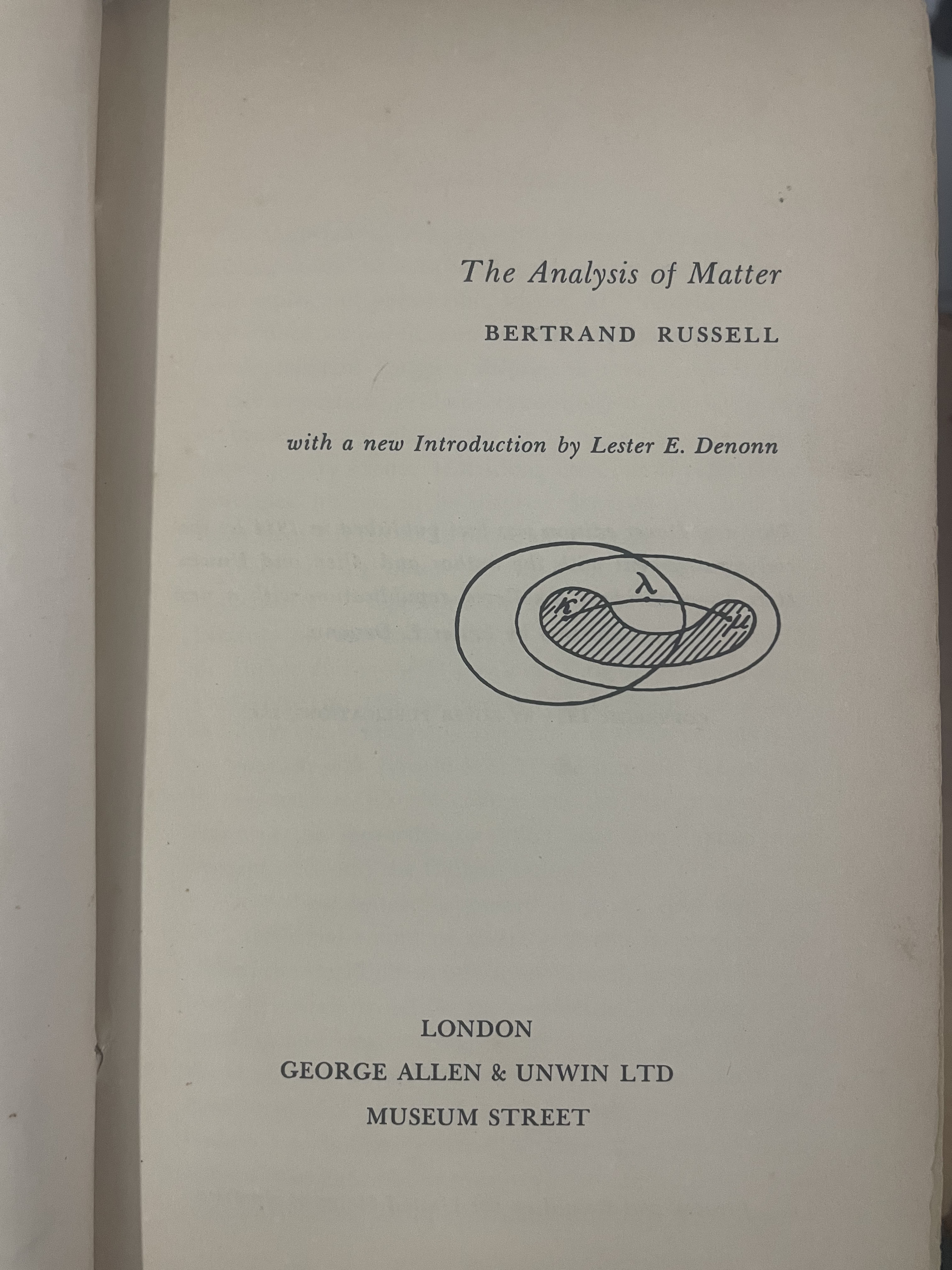The Analysis of Matter

About
Summary
Exquisite
TOC
Details
Related
URL
Images
Overview
Bertrand Russell's The Analysis of Matter, published in 1927, delves into the philosophical foundations of physics amidst the groundbreaking developments of relativity and quantum theory1. Russell, a prominent philosopher, logician, and mathematician, sought to provide a stable foundation for physics during a period of significant theoretical change. He proposed replacing the concept of matter with a logical construction based on events. This approach, he argued, allows physicists to proceed without assuming the existence of matter, although it doesn't disprove its existence.
Russell posits that fundamental constituents of matter, such as electrons and protons, are essentially groups of events connected in specific ways, and their properties are sufficient for physics. In The Analysis of Matter, Russell aims to define central mental concepts using events rather than experience. He employs logical constructions to imbue these concepts with the properties that psychologists expect.
Importance of Book
The Analysis of Matter represents a significant attempt to synthesize modern quantum theory. Russell's work addresses the epistemology of the natural sciences, exploring the foundations of our knowledge of nature. By questioning the traditional concept of matter, Russell encourages a re-evaluation of the fundamental building blocks of the universe. Instead of matter, Russell proposes events as the fundamental building blocks of the universe. These events are considered neutral, existing independently of mind and matter, aligning with neutral monism.
Russell's exploration of the relationship between physics and philosophy is particularly relevant. He emphasizes the importance of logical analysis in understanding the physical world. This book serves as a bridge between abstract philosophical concepts and the concrete realities of physics.
Key Themes
Logical Construction: Russell advocates for replacing the concept of matter with logical constructions based on events. This approach allows for a more rigorous and precise understanding of the physical world.
Events as Fundamental: The book posits events as the basic building blocks of reality, neutral between mind and matter. This perspective challenges traditional substance metaphysics.
Epistemology of Science: The Analysis of Matter explores the foundations of scientific knowledge, particularly in physics. Russell examines how we can know and understand the natural world.
Neutral Monism: Russell adopts a monistic viewpoint, asserting that the universe is composed of a single type of substance that is neither exclusively mental nor exclusively physical. This concept seeks to reconcile the mental and physical aspects of reality.
The Nature of Matter: Russell questions the traditional concept of matter, suggesting it can be replaced by logical constructions. This challenges the assumption that matter is a necessary foundation for physics.
Language and Reality: Russell emphasizes the importance of an ideal language for accurately describing the world. He critiques ordinary language for its imprecision and advocates for the use of mathematics and mathematical logic to express physical concepts accurately.
Cultural Significance
Bertrand Russell's work, including The Analysis of Matter, has had a lasting impact on 20th-century thought. His contributions to logic and analytic philosophy have shaped the way philosophers approach questions of knowledge, reality, and language. As one of the founders of analytic philosophy, Russell's emphasis on logical analysis and clarity has influenced generations of philosophers. His work has also influenced various fields beyond philosophy, including mathematics, computer science, and artificial intelligence.
Russell was a public intellectual who engaged with social and political issues throughout his life. His pacifism and advocacy for social justice have inspired many. His writings on war, peace, and social reform continue to be relevant in contemporary discussions.
Effects on Society
Russell's ideas often challenged conventional wisdom and encouraged critical thinking. His advocacy for nuclear disarmament and his opposition to the Vietnam War demonstrate his commitment to using his intellectual influence to promote peace and social justice.
Russell's belief in a scientific society where war is abolished, population growth is limited, and prosperity is shared reflects his vision for a better world. He also advocated for a single world government to enforce peace, highlighting his concern for global cooperation and the well-being of humanity.
Conclusion
Russell’s book underscores the importance of education, the dangers of unchecked power, and the necessity of cooperation for the betterment of society. His work encourages a critical examination of societal structures and a commitment to creating a more just and peaceful world.
Title
The Analysis of Matter
Author
Bertrand Russell
Name of Publisher
George Allen & Unwin Ltd London
Publish Date
1954
Subject
A philosophical and scientific exploration of the nature of matter.
Vintage
1948-2000
Edition
First
Number of Pages
408
Category
Literary
Sub Category
Philosophy
Rarity
Normal
